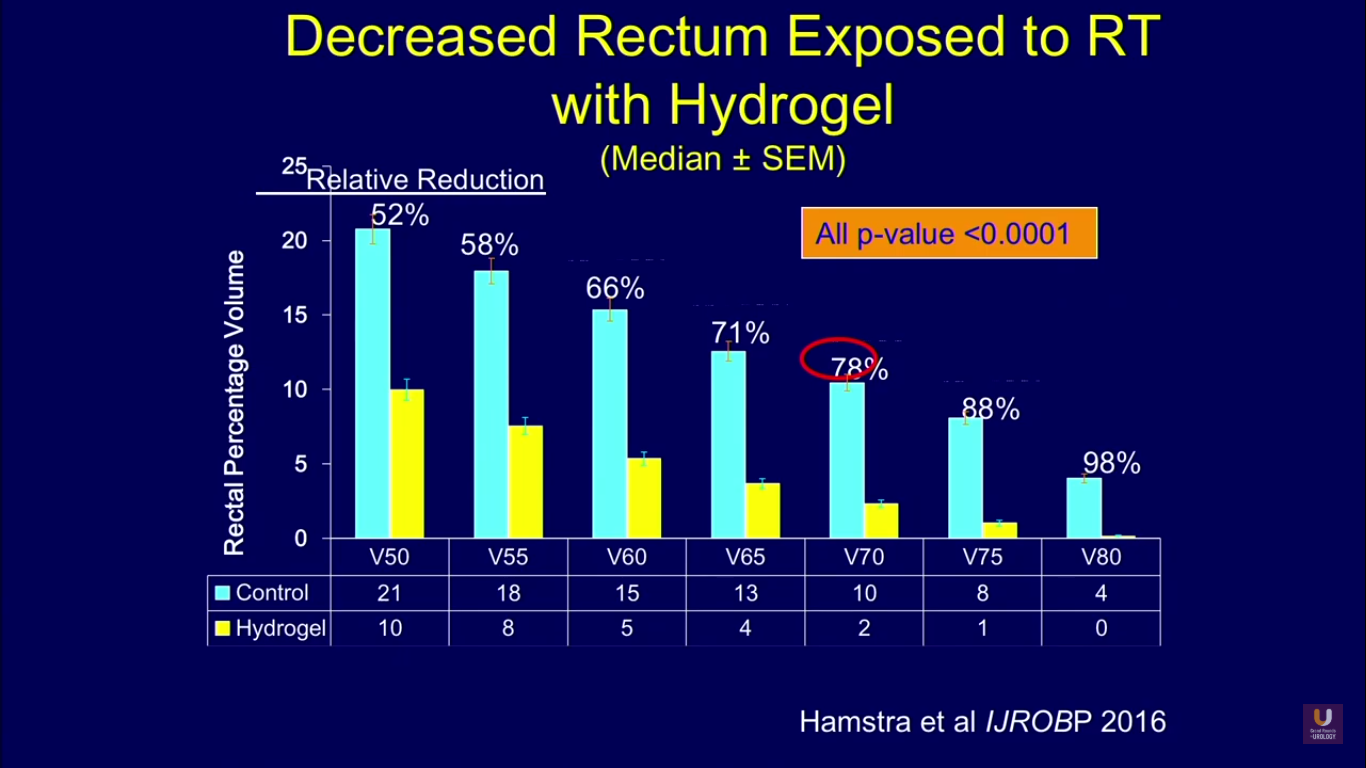Michael J. Zelefsky, MD, presented “Role for Rectal Spacer in the Radiotherapeutic Management of Prostate Cancer” during the 24th Annual Southwest Prostate Cancer Symposium on April 14, 2019 in Scottsdale, Arizona.
How to cite: Zelefsky, Michael J. “Role for Rectal Spacer in the Radiotherapeutic Management of Prostate Cancer” April 14, 2019. Accessed Feb 2026. https://grandroundsinurology.com/role-for-rectal-spacer-in-the-radiotherapeutic-management-of-prostate-cancer/
Role for Rectal Spacer in the Radiotherapeutic Management of Prostate Cancer – Summary:
Michael J. Zelefsky, MD, examines the clinical issue of rectal toxicity in prostate cancer patients treated with prostate radiotherapy. He reviews the current findings on the efficacy of rectal spacers in reducing rectal, gastrointestinal, and genitourinary toxicities in these patients.
Abstract:
Randomized trials of moderate hypo-fractionated external beam radiation therapy (EBRT), including CHHiP, HYPRO, PROFIT, and RTOG 0415, have shown that rectal toxicity is still a clinical issue for patients undergoing radiation therapy for prostate cancer. Furthermore, ongoing trials evaluating ultra-hypofractionated stereotactic body radiation therapy (SBRT) are predicted to show similar or higher rates of rectal bleeding than the aforementioned trials. A possible solution to reducing this adverse effect and improving patient’s quality of life (QOL) is the application of rectal spacers.
A phase III randomized trial measured QOL, toxicity, and rectal dose in patients treated with conventionally fractionated EBRT using either fiducial markers alone or fiducial markers and a hydrogel spacer. The hydrogel spacer group experienced a significant reduction of rectal exposure.
Initially, the difference in rectal toxicity was negligible, but after three years, there was a significant benefit seen in the rectal spacer patients. Interestingly, this trial demonstrated that the spacers provided better prevention of urinary incontinence as compared to the control. This phenomenon merits further investigation.
In an accruing Phase I-II dose escalation study at Memorial Sloan Kettering Cancer Center (MSKCC), a total of 551 prostate cancer patients received dose-escalated SBRT (40 Gy over 5 fractions). 269 of the 551 patients received a hydrogel spacer. A significant benefit for gastrointestinal and genitourinary toxicities was found.
In conclusion, rectal spacers, along with careful planning, add another enhancement to deliver radiation with a greater degree of conformality. The routine use of rectal spacers with radiation therapy can minimize toxicity, as well as potentially reduce the incidence of secondary cancers in these patients.
About the Southwest Prostate Cancer Symposium
The Southwest Prostate Cancer Symposium (SPCS) is a multi-day conference that seeks to educate urologists, radiation oncologists, medical oncologists, and other healthcare professionals involved in the treatment of prostate cancer. The topics focus on current technical aspects of diagnosis and treatment of localized and advanced disease, particularly regarding imaging, technology, and training in the related devices. Dr. Zelefsky presented this lecture during the 24th SPCS in 2019. In 2020, the 25th SPCS will also offer training sessions involving imaging, scanning, and prostate cancer treatment related devices on site. Please visit this page in order to register for future SPCS meetings.
ABOUT THE AUTHOR
Michael J. Zelefsky, MD, is Professor of Radiation Oncology and the recipient of the Greenberg Chair for Prostate Cancer Research at Memorial Sloan Kettering Cancer Center in New York City. He is a board-certified radiation oncologist and co-leader of Memorial Sloan Kettering’s Genitourinary Disease Management Team, a multidisciplinary group of physicians who work together to treat patients with urologic malignancies. As a recognized expert in the field of radiation therapy, Dr. Zelefsky is Chief of Memorial Sloan Kettering’s Brachytherapy Service.
The prostate brachytherapy program at Memorial Sloan Kettering, which Dr. Zelefsky helped develop and enhance since joining the staff in 1990, is known for its depth of experience and cutting-edge approach in treating men with prostate cancer. For patients with advanced or aggressive prostate cancer, he has significant expertise using high-dose-rate brachytherapy and temporary brachytherapy, in which patients receive several high-dose treatments either as a boost or as the sole treatment. Dr. Zelefsky also has experience using brachytherapy in patients whose tumor has recurred after external-beam radiation therapy or seed implant, as well as expertise using image-guided stereotactic radiosurgery for areas of metastases (spread) such as bone or lymph nodes.
In addition, Dr. Zelefsky was instrumental in pioneering the use of IMRT (intensity-modulated radiation therapy, which is computer-guided delivery of high doses of radiation directly to the tumor) and IGRT (image-guided radiotherapy, radiation beams targeted precisely to the tumor) for treating men with prostate cancer. He is Editor-in-Chief of Brachytherapy, a medical journal that addresses all aspects of this sub-specialty. He is also a past president of the American Brachytherapy Society.
For his work in this field, Dr. Zelefsky has been honored to receive several awards including the Boyer Award for Excellence in Clinical research, the Outstanding Teaching Award in the Department of Radiation Oncology at Memorial Sloan Kettering, the 2009 Henschke Medal (the highest award of the American Brachytherapy Society for achievements in Brachytherapy), and the 2009 Emanuel Van Descheuren Award for Excellence in Translational Research.

